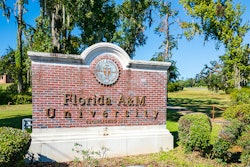While studying chemistry at Xavier University in New Orleans,
Robert Swayzer III excelled in the classroom during his freshman and
sophomore years. Although the twenty-three-year-old Winnsboro,
Louisiana, native decided against pursuing medical school early on in
his college career, Swayzer’s performance as a chemistry major won him
an environmental research scholarship as a junior through Xavier’s
Center for Environmental Programs.
That scholarship, which was funded by the U.S. Environmental
Protection Agency (EPA), allowed Swayzer to work with Xavier faculty to
develop materials that absorb toxic chemicals from waste water. As a
result of the research experience, Swayzer grew more interested in
environmental science and won another research award. He became an
Environmental Justice Scholar at Xavier’s Deep South Center for
Environmental Justice (DSCEJ) during the 1995-96 school year.
As an employee at the Xavier center, Swayzer now coordinates
student programs and publishes community newsletters on environmental
issues. Next fall, he expects to enroll in a master’s program in
Industrial Hygiene at Tulane University’s School of Public Health in
New Orleans.
“My goal is to work in industry in a capacity where I can help a
company improve its safety practices in the workplace and assist it in
safely disposing toxic chemicals,” Swayzer said.
Swayzer’s story is part of an educational movement that is sweeping
historically Black colleges and universities (HBCUs) and other minority
institutions. Over the past seven years, a dramatic expansion of
environmental education has transpired. Through partnerships with the
federal government, largely the U.S. Department of Energy (DOE) and
EPA, institutions have developed environmental education programs that
are attracting students to environmental careers.
A total of seventeen schools comprise the Historically Black
College and University/Minority Institution Environmental Technology
Consortium (ETC), which has been funded for the past five years by DOE.
In 1990, ETC was organized to participate in federally-funded
environmental programs. Since winning the support of DOE, member
schools have dramatically added environmental education courses,
content and degree programs to their curricula. They have established
outreach programs with their local communities and pre-college
students, and have provided environmental education training for
faculty.
“We have become part of an effort I where we are among the leading
institutions. Traditionally, HBCUs have played catch up,” said Dr. Kofi
B. Bota, the consortium’s director and vice president for research and
sponsored programs at Clark Atlanta University in Atlanta.
Adding momentum to the expansion of environmental education at many
HBCUs has been the environmental justice movement and The College
Fund/UNCF. Originating as a grassroots community campaign in the early
1980s, the environmental justice movement has prompted four consortium
schools, including Xavier, to establish research centers to work
directly with communities adversely affected by environmental problems.
Since 1992, the U.S. Environmental Protection Agency has charged
its Office of Environmental Justice “with a broad mandate to serve as a
focal point for ensuring that communities comprised predominately of
people of color or low income populations receive protection under
environmental laws.” EPA’s Office of Environmental Justice has
supported community-based/grassroots organizations that are working on
solutions to local environmental problems with a small grants program.
Terry Davies, director of the Center for Risk Management at
Resources for the Future, a Washington, D.C.-based non-partisan,
environmental issues think tank, said it’s well documented that
exposure to hazardous pollutants and polluting facilities. He added,
however, that there is a wide range of thought on what the
environmental justice movement is supposed to achieve. “It’s not clear
what the environmental justice agenda is,” beyond the “universally
accepted” idea that subjecting disadvantaged communities to
disproportionate levels of polluting facilities is wrong, according to
Davies.
Davies said there’s considerable cleanup work to he accomplished in communities.
In 1994, The College Fund/UNCF launched an environmental education
program for its member schools. It has coordinated programs which have
resulted in research consortiums among member schools working with EPA,
DOE, foundations and companies. The College Fund/ UNCF has opened the
door to corporations which are looking to improve their environmental
records.
Environmental Justice Movement Finds a Home
Along the eighty-mile route between New Orleans and Baton Rouge,
Louisiana, lies a swath of chemical processing plants and oil
refineries. Residents in communities near the plants have complained
for years that toxic wastes and emissions from the plants and
refineries have contaminated their drinking water, air and soil. The
route is commonly referred to as “Cancer Alley” by residents and
activists because blame for the disproportionate number of serious
illnesses suffered by residents has been placed on the region’s
industries.
For the past twenty years, a national campaign focusing on the
disproportionate exposure to pollutants that minority and low-income
communities have encountered in places such as Louisiana’s Cancer Alley
has emerged into what is known as the environmental justice movement.
The crusade for environmental justice has grown largely out of the
experiences of African Americans, Native Americans and Latinos whose
communities have been overburdened with nearby hazardous waste sites,
incinerators, petrochemical plants, lead contamination, dirty air and
contaminated drinking water.
Citing numerous examples, activists have charged companies and
local governments with “environmental racism.” These new crusaders have
produced evidence showing that minorities are bearing a
disproportionate level of exposure to toxic wastes because companies
have deliberately built their disposal facilities close to minority
communities.
With the wave of environmental education sweeping HBCUs, the
environmental justice movement seems to have found an institutional
home. In the past four years, four schools have elected to establish
environmental justice centers on their campuses. The centers have
largely been assigned to assist communities suffering from high
exposure to toxic waste disposal and polluting facilities, and to
conduct environmental research projects.
Xavier’s DSCEJ was the first center established. Dr. Beverly
Wright, a sociologist who founded the DSCEJ in 1993, said the center
works with thirteen different communities that are based along Cancer
Alley and the New Orleans public schools district. The center, which
has nine staff members, coordinates a wide range of projects, most of
which are based in the communities with which DSCEJ is partnered.
“Empowering community residents with the knowledge and know-how to
help themselves is one of our first priorities,” Wright said.
Tasks have included: helping community residents to evaluate
residential buy-out plans by industry; analyzing soil and water samples
in communities for toxins; training community residents for jobs in the
waste cleanup industry; and training residents to participate in local
governing and community councils to influence environmental policy.
At a recent DSCEJ workshop for its community partners, residents
were introduced to personal computers and taught to access
environmental databases such as the Toxic Release Inventory and
Community Right to Know. At other workshops held earlier this year,
residents learned environmental terminology, leadership skills, and
strategies to influence local environmental policies, according to
Wright.
In addition to Xavier and Clark Atlanta University (CAU), Hampton
University and Texas Southern University (TSU) also host environmental
justice centers. Dr. Robert Bullard, director of CAU’s center, said
many HBCUs are located near communities surrounded by environmental
problems.
“Our schools have to be involved in finding solutions for our
communities, and that’s why I started this center at Clark Atlanta,”
said Bullard, who is a sociologist.
Wright believes that each of the four centers has become known for
its niche: Xavier for its community programs; CAU for its clearinghouse
activities, and as a convener of frequent national conferences and
symposiums on environmental justice; Hampton for the technology its
center develops around Geographical Information Systems (GIS) or
computerized mapping systems; and TSU for its legal activism in the
environmental justice arena.
A number of other schools have also established programs in
environmental justice. Tuskegee University faculty and students have
been working with officials in Pritchard, Alabama, for the past year to
help revitalize areas that have been contaminated by toxic waste.
Tuskegee officials say the goal of revitalization is to clean
contaminated sites and make them attractive to cleaner industry.
“We’re trying to develop a partnership model that we can take to
other Alabama cities and towns,” said David Said, Coordinator of
Environmental Justice Programs at Tuskegee University.
Expansion Rooted in DOE’s Mission
Just a few years before the environmental justice movement reached
HBCUs, the expansion of environmental education had already taken
flight with ETC. The idea of having a consortium to expand
environmental education came from an EPA official working at CAU who
suggested it to university officials in 1989. Later that year, Bota and
officials at other schools began exploring the formation of an academic
consortium because they believed the federal government would be
receptive. The consortium was formally organized in January 1990.
“The basic rationale for the consortium was that unlike other
fields, environmental programs require interdisciplinary cooperation
across several fields. The feeling among us was that no one institution
had all the resources to effectively partner with the federal
government on a large-scale program,” Bota said.
In April 1990, DOE began seeking proposals from academic
organizations which wanted leadership roles in environmental education
and technology development. For more than forty years, DOE had been
charged with building and maintaining the nation’s nuclear arms
arsenal. During that time, the weapons building process had generated
large quantities of toxic, hazardous and radioactive waste. DOE was
responsible for the safe management and disposal of the waste.
DOE set out to develop partnerships that would enable academia to
play an active role in the agency’s mission of managing and disposing
hazardous radioactive waste. Consortium leaders recognized that working
with DOE could lead to the overall expansion of science and engineering
resources at their institutions. They also recognized that
environmental education expansion could draw more minority students
into science and engineering careers — one of the stated goals of ETC.
After submitting one of thirteen proposals to DOE, the consortium
was chosen, in September 1990, to develop a plan for environmental
education and technology development. Starting in fiscal year 1991, DOE
began allocating $5 million annually to ETC. The annual funding, which
was divided among the seventeen schools for a period of five years,
enabled them to address four areas: community outreach and pre-college
education; undergraduate education and post-secondary training;
graduate and postgraduate education and research; and technology
transfer.
“We were the first such consortium to work with DOE as an academic
partner,” said Bota, adding that other schools have joined together to
copy the ETC model while competing for DOE programs.
Consortium school officials say participation in the DOE program
has accelerated the pace of environmental education expansion. In 1992,
Jackson State University in Jackson, Miss., established a Ph.D. program
in environmental sciences. It is the only program of its kind in
Mississippi and one of the largest in the United States with
twenty-nine students, according to Jackson State officials. Dr. Abdul
Mohamed, dean of the School of Science and Technology at Jackson State,
credits the consortium with helping the institution beef up its overall
environmental curriculum and establish a Ph.D. program.
“The process would have been much slower [without ETC],” Mohamed said.
Because of DOE’s influence, consortium schools have begun
successfully competing for environmental education and technology
grants from other federal agencies. For example, the U.S. Department of
Defense, burdened by its own waste management responsibilities, has
awarded several ETC schools environmental education and technology
grants.
Tony Cortese, president of the Boston-based organization known as
Second Nature which advocates environmental education at American
colleges and universities, said growth in environmental education in
American higher education has “exploded” over the past ten years.
“More than 500 colleges and universities now have environmental
studies programs,” said Cortese, who acknowledged that over the past
decade, ETC has emerged as a leader in providing extensive
environmental education opportunities.
The College Fund/UNCF Jumps onto the Fray
In an effort to boost environmental education at private HBCUs, The
College Fund/UNCF began coordinating environmental education
initiatives for its member schools in 1994. The move, spearheaded by
The College Fund/UNCF President William Gray, has attracted support
from the federal government, private foundations and corporate
sponsors. The fund coordinates programs which are sponsored by EPA,
DOE, foundations and corporations.
“It was a logical next step for UNCF,” according to Dan Durett,
director of the fund’s department of environmental education programs.
“Our role is to provide leadership for the UNCF schools and to identify
sources of technical assistance and fiscal support for environmental
education. “
Durett was previously the director of environmental justice
outreach for the Washington, D.C.-based Committee for the National
Institute for the Environment. He joined The College Fund/UNCF in 1994.
The EPA is providing money for The College Fund/UNCF’s Pejer grants
program, which supports environmental justice research. The Heinz
family and Andrew Mellon foundations also support environmental
education programs.
The College Fund/UNCF programs include a DOE-supported fish
subsistence survey at the Savannah River nuclear plant in South
Carolina that was conducted by seven schools. The purpose of the
ongoing study is to determine to what extent people rely on fishing in
the Savannah River to meet their food and economic support needs,
Durett said.
Another program, supported by WMX Technologies, Inc., of Oak Brook,
Illinois, is designed to introduce students to possible careers in the
waste management industry. In another instance, Star Enterprise of
Houston, Texas, a petroleum products company, is working with
Huston-Tillotson College to develop a risk communication and public
awareness program for the company.
Attracting corporate help is critical because it broadens the base
of support for such programs. And with pressures on the federal budget
mounting from year to year, “it behooves us to seek out additional
sources of support for environmental education so we don’t allow all
our eggs to be put in one basket,” said Durett, who added, “It’s very
easy to point the finger at industry as the bad guy. But at the same
time, industry is a key player in solving the problems.
“We need to build bridges between corporate America and the
colleges and their communities. Corporate America has a bottom line and
they can meet their bottom line by utilizing the skills and talents
available on our campuses,” Durett said.
DOE funding has infused environmental content into courses across
the academic spectrum, according to consortium officials. Pleased with
its performance during the first five years of its partnership, DOE has
pledged to support the consortium for another five years. And as
consortium schools shift their focus to more technology-intensive
tasks, officials say they are optimistic that environmental interest
will grow stronger at their schools.
“The emphasis has changed from one primarily of environmental
education to one of technology development. We’re getting to the
bread-and-butter issue of cleaning up the environment. We’ve got to
help DOE solve the problem,” Bota said.
COPYRIGHT 1997 Cox, Matthews & Associates
© Copyright 2005 by DiverseEducation.com















